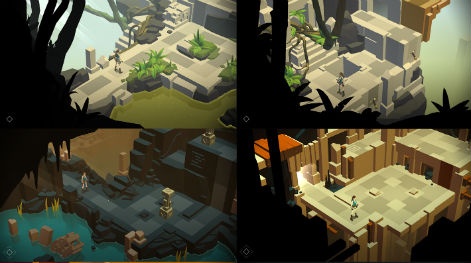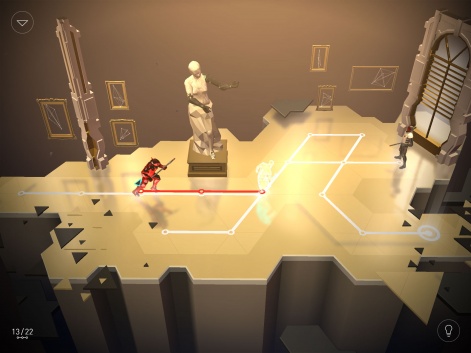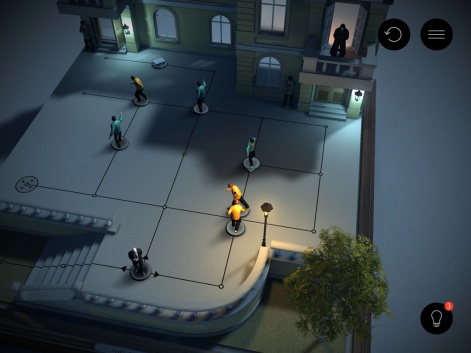Square Enix Montreal may have been founded to work on console games, but the Canadian developer has made its name in premium mobile titles.
The studio has released hit mobile games such as Hitman GO, Hitman Sniper, Lara Croft Go and most recently Deus Ex GO.
Not keen to go the way that 79% of all apps on the App Store have gone with free, the team has forged its own path with critically acclaimed titles with an up-front cost. But interestingly, its games also include in-app purchases on top of the premium price.
Square Enix Montreal Head of Mobile Patrick Naud says part of the reason the studio opted for paid games is due to its history in console and the expertise it initially lacked in free-to-play.
“We felt there were already way too many learnings to do to even try to embrace the free-to-play route,” he admits.
“And actually that was a great decision because the premium space is something we mastered. Bringing games to market for a company like Square Enix in the premium space is something we all know about.
“But also, it helped us differentiate ourselves from the very crowded mobile market by offering high quality premium titles. It’s something not only journalists like but something even Apple and Google like. They like to promote these games because they are different.”
Premium design
The studio is a staunch proponent of premium, and is always thinking with premium in mind give the tough realities of becoming a good free-to-play company, which Naud says “requires people to think a certain way, to have a certain approach, and we didn’t have that yet”.

“We still strongly believe in the premium market,” he says.
“There’s so many people that are looking for a high quality defined experience, a finite time, that want to finish something, that want to conclude on something, that want to make sure they reach the end, and we can cater to these people.”
We’ve gone in-depth on monetisation design in the PocketGamer.biz Mobile Games University, but there's a distinct focus on monetising free-to-play in those articles.
Naud says while the studio focuses on these premium experiences, that doesn’t mean it can’t use in-app purchases seen in free-to-play, or that its premium nature doesn't affect game design.
Players shouldn’t be forced to pay for IAPs, they should be able to have it when they need it.Patrick Naud
Part of Square Enix Montreal's game design process is still how it can use IAPs in its titles, but not in a way that damages the experience or that a player has to make purchases to progress.
Take the hint
Typically, the GO games make extra money charging for hints, which users can buy in packs if they choose. But it’s in no way a key element of the games.
Rather, Naud calls it a services-based approach to premium, and is for people who want to speed up their progress and are after such an additional layer of service.
“For example, in the GO series we want to make sure we keep on having hints, because there’s nothing more frustrating than people wanting to finish the experience and being stuck on something,” explains Naud.
“So for us it was important that was there. But we’re not pushing those strongly, we’re not putting that in your face, we’re not upping big advertisement and bringing you to the store, we see it as an additional layer of service.
“There’s a positive way to do IAPs, if you’re not being triggered, and our users are actually enjoying that layer and they don’t feel forced. And that’s the thing, they shouldn’t be forced to pay for IAPs, they should be able to have it when they need it.”
Naud admits the up-front pricing is where Square Enix Montreal makes most its money, but stresses the importance of IAPs isn’t just in the revenues – it’s to help players along, particularly those with little time to invest.
IAPs still have a place
“In a game like Hitman Sniper, where people are looking at progressing faster or playing in different ways, we’ve put more emphasis on bringing in new guns,” he explains.
“And that generates a little bit more revenue, but again, most of the guns are there to speed up the process, allow you to challenge your friends in different ways and to help the people who don’t necessarily have as much time to invest in the game.”
A key design challenge for premium games is keeping players engaged in the long-term – should that be an aim of your studio.
Naud says one of its learnings from the GO series is that lots of players will come and play the game, and once they’re done, will likely remove it from their phones, even if they loved the experience.

At this point, they’ll likely even stop talking to their friends about it, affecting organic downloads.
To come up with a solution, the studio turned its focus to engagement and retention, terms commonly used in free-to-play.
This has resulted in the release of daily challenges each week in Deus Ex GO, that get increasingly difficult day by day. Naud says this has helped double day one retention and increased day 15 retention by three times its previous rate.
We figured out that people that consumed IAPs have stronger engagement with the game.Patrick Naud
It has also implemented a new puzzle editor which it hopes will add long-term replayability as players create their own maps for others to play.
“We want to make sure that the players have the possibility to make their own puzzle, challenge their friends, come back to the game and have an infinite amount of puzzles,” states Naud.
“This is our approach to trying to fix the challenge of premium on mobile.”
Engage, retain, acquire
While adding new content and increasing engagement and retention through user generated content is nice, does it really make business sense in premium?
Naud believes there’s a couple ways it works for the developer. Firstly, it keeps people talking about it, which can lead to more organic downloads in the long-term.

At the same time, the studio is trying out new IAPs, such as undo’s in Deus Ex GO for players who don’t want to retry a whole puzzle from the get-go, while adding a new competitive challenge. It's an addition that potentially makes business sense and could open up new ways to play for players.
“We figured out that people that consumed IAPs have stronger engagement with the game, they stay with the game longerm" he says.
GO was developed with a premium audience in mind, it wouldn’t work as free-to-play.Patrick Naud
“And, as an example, on Hitman Sniper, people that have bought IAPs play three times longer than people that haven’t. So again, for us it’s also another tool to make sure that we have as many people playing the game daily as we can.”
No way free-to-play
An important point that Naud notes is that, having designed these games as premium titles, there is no way the GO games could be turned into free-to-play as they are.
It’s an important aspect of game monetisation design – that a developer’s method of monetisation needs to be planned for from the start, not just for their sake, bur for the player’s.
“There’s a lot of trial and error in the GO series, but that’s part of the design,” says Naud.
“For a free-to-play game, where people are trying a lot of different games and will drop out as soon as something doesn’t work, that wouldn’t work. But that’s one of the many examples that makes it that this game would not work. Monetisation would not work.
“The way the systems and mechanics are exposed, the size of the game, all these things compound. Again, it was developed with a premium audience in mind, that’s why it works and it’s coherent for that kind of game, it wouldn’t work as free-to-play.”























